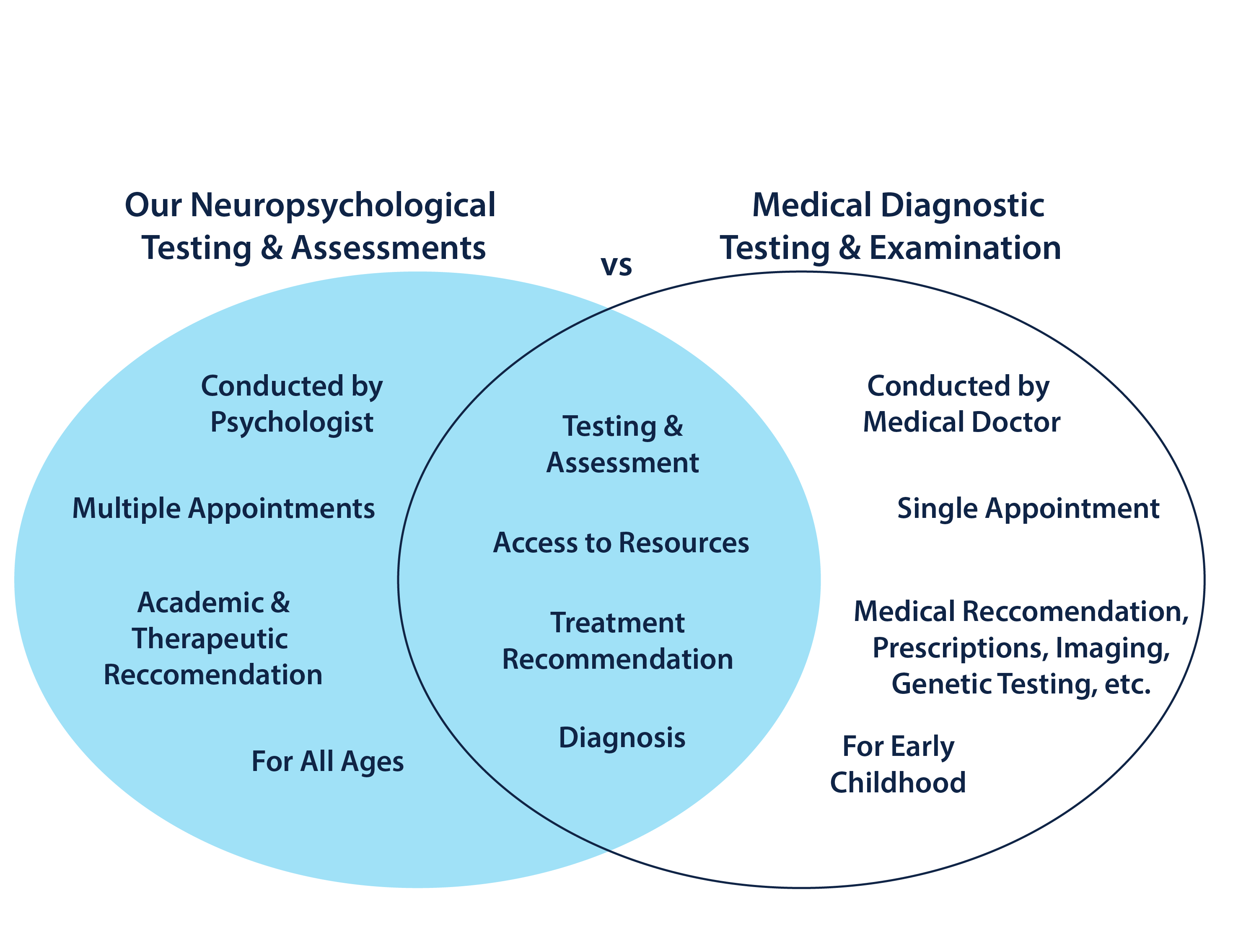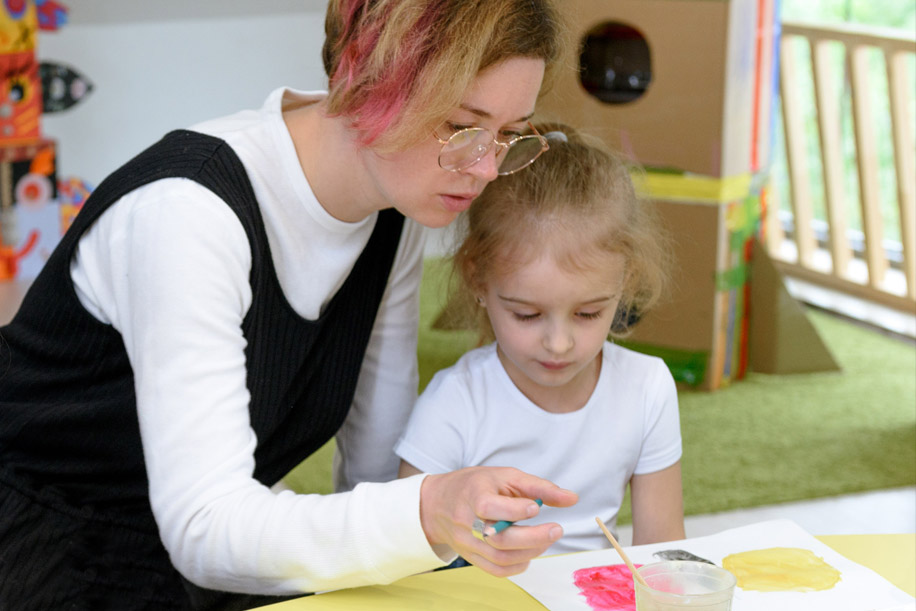What is Neuropsychological Testing?
Neuropsychological testing at Blue Bird Day is a non-medical testing and assessment process conducted by our Clinical Psychologist. We focus on assessment and diagnosis to identify the strengths and needs of children at all stages of development. We take a therapeutic assessment approach, meaning that we help individuals and families identify goals for testing, and collaborate to identify what they hope to learn about themselves or their children in the assessment process. Our hope is that, through testing, individuals can gain an understanding of themselves, their diagnosis, and their needed supports.
We know that testing and getting a diagnosis can be stressful for many families. Our team wants to make sure that families feel supported in the process, and we strive to present clear communication and feedback with resources and recommendations for the next steps.
The testing process begins with an intake session, conducted with our Clinical Psychologist. During this virtual session, they will ask questions about what led you to seek testing, concerns, and symptoms. They will work with you to determine goals for testing, such as wanting to clarify or update a diagnosis, explore if you or your child needs a new diagnosis, or determine what therapies and school accommodations are best for you or your child. They will also gather information about developmental history, medical/physical health needs, family history, educational history, social history, and major stressors you or your child may be facing. All of this information will help to inform the testing process. We may also ask about sensory preferences or special interests and do our best to have some of these available to help build rapport and engagement in testing.
The next step is the one-on-one testing, which can be completed in one to three sessions depending on the concerns. During these 2–3-hour appointments, the client will be asked questions about themselves and complete “brain games,” puzzles, play, and other activities that will explore skills and symptoms discussed at the intake. Some assessments are more formal in nature, like sitting to look at pictures or information and answering questions about them. Please note that our tests are all psychological in nature, and we do not conduct medical diagnostics, like brain/body scans, or write prescriptions. Since these sessions can be long, we provide time for rest or play breaks. If your child is already attending Blue Bird Day, Eyas Landing, or Merlin Day Academy, we can work with their treatment team to support transitions and build familiarity.
Parents will also be provided with forms to complete for testing. These forms will inquire about different behaviors and symptoms to help inform testing. If your child is in school, we may also request that teachers, coaches, or others familiar with your child complete similar forms. This helps us to get a well-rounded view of the child.
The final step of our testing process is a virtual feedback session. At this time, we review the findings from the testing, discuss our impressions based on the information we obtained, discuss diagnoses, and explore recommendations. Our recommendations provide you with therapeutic and educational support recommendations and a diagnosis to access school and therapy services. If you are seeking prescriptions, we can work with your child’s pediatrician to discuss medication options as well as other interventions. We work to provide education on diagnosis and individualized recommendations based on your unique needs.
You will receive a copy of your testing report after your feedback session. Sometimes questions come up after having time to sit with the report or after discussing it with teachers or other family members. We’re here to support the whole process, so we encourage you to reach out with questions or set up a follow-up appointment.
Neuropsychological Testing vs. Medical Diagnostic Testing
Depending on a child’s age, behaviors, and concerns, you may seek Medical Diagnostic Testing or Neuropsychological testing. But what’s the difference? Let’s look at each of these assessments, the similarities, differences, and how to know what is best for your child.
It’s important to know that when we talk about things like Autism, ADHD, Dyslexia, and other neurodiversities, there are no medical tests, such as blood tests or medical imaging, to verify these diagnoses.
Both Medical and Neuropsychological testing relies on gathering behavioral observations, developmental history, family history, and environmental information. In fact, they may use some of the same measures, such as the ADOS-2, BASC-3, and other assessments to gather information.
The biggest difference lies in their scope of assessments. While Neuropsychologists are trained in psychological, social-emotional, and learning development, Medical Diagnosticians are trained in medical health and physical development. There is a great deal of overlap in many diagnoses, including developmental differences and delays. But there are a few differences in their approach, especially when it comes to a child’s age and assessment needs.

What Does An Evaluation Entail?
Goals of Neuropsychological Testing
The testing team at Blue Bird Day aims to help our clients and families better understand themselves and their children. By providing comprehensive assessments, we are able to outline not only diagnoses but strengths, needs, and recommendations for therapy and educational supports to help your child continue to grow and develop.
Many individuals come to testing seeking information about what can help themselves or their children at work, school, or other settings. Our testing team can provide recommendations for accommodations that can support their learning and are ready to work with schools to advocate for these supports. Blue Bird Day’s Clinical Psychologist is also a Nationally Certified School Psychologist and can provide guidance on appropriate services and accommodations to seek through IEPs and 504 plans at public school placements, depending on the results and diagnoses received from the evaluation.
For clients presenting with a known medical diagnosis, we can explore their developing skills and needs. Many of our clients at Blue Bird Day, Eyas Landing, and Merlin Day Academy presenting with Down syndrome, seizures, and other medical concerns have benefitted from neuropsychological testing to better understand their adaptive skills, development, and behavioral and emotional needs.
Areas we May Focus our Assessment
Do I Really Need Neuropsychological Testing for My Child?
Many parents grapple with whether or not to go through formal testing and diagnosis for their child when it comes to emotional, behavioral, and learning difficulties. While they may see struggles with anxiety, communication, attention, or simply frustration with school, they question what a diagnosis means, fear the stigma, or worry about what impact it might have on their child’s future. They want to help their child and find resources but they are not sure where to go for answers. Neuropsychological Testing seems complicated, and diagnosis can be scary for many parents.
A formal diagnosis is one tool that can help children qualify for services such as an IEP, 504 plan, or ABA therapy. It can also provide documentation to jobs, clubs, and other organizations about what types of supports can help a child feel confident, participate, make friends, and learn to the best of their ability. While schools and insurance companies are the ones who ultimately make the decision about what services will be provided, a comprehensive neuropsychological report can provide the framework and the evidence that these services are beneficial to a child’s learning and development. Our team can provide more information and guidance on what these processes look like.
While a diagnostic label can be scary for parents, for many children, teens, and even adults, it can be a doorway to self-understanding. Being able to say “Oh, this is why I do that!” or “Wait, other people do this too? I’m not alone?” can be a powerful experience. From finding supportive communities, to developing a positive identity, self-advocacy starts with understanding your needs and it’s the goal of the teams at Blue Bird Day, Eyas Landing, and Merlin Day Academy to support this journey.
Not all children need testing. Many will thrive without these formalized interventions. They may benefit from things such as tutoring, talk therapy, or other interventions that don’t require extensive testing. And if you’re on the fence, there’s lots of options to try!
You can start by talking to teachers about supports they can provide in the classroom, like fidgets or check-in sessions, enrolling your child in peer group activities, or meeting with a therapist or pediatrician to learn more about how to best support your child.



